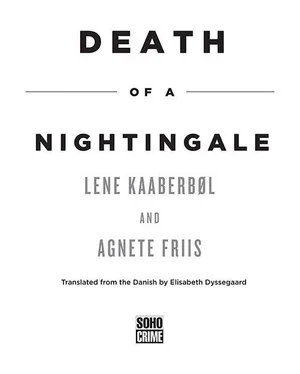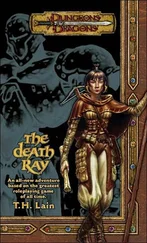Lene Kaaberbol - Death of a Nightingale
Здесь есть возможность читать онлайн «Lene Kaaberbol - Death of a Nightingale» весь текст электронной книги совершенно бесплатно (целиком полную версию без сокращений). В некоторых случаях можно слушать аудио, скачать через торрент в формате fb2 и присутствует краткое содержание. Год выпуска: 2013, ISBN: 2013, Издательство: Soho Crime, Жанр: Старинная литература, на английском языке. Описание произведения, (предисловие) а так же отзывы посетителей доступны на портале библиотеки ЛибКат.
- Название:Death of a Nightingale
- Автор:
- Издательство:Soho Crime
- Жанр:
- Год:2013
- ISBN:1616953047
- Рейтинг книги:5 / 5. Голосов: 1
-
Избранное:Добавить в избранное
- Отзывы:
-
Ваша оценка:
- 100
- 1
- 2
- 3
- 4
- 5
Death of a Nightingale: краткое содержание, описание и аннотация
Предлагаем к чтению аннотацию, описание, краткое содержание или предисловие (зависит от того, что написал сам автор книги «Death of a Nightingale»). Если вы не нашли необходимую информацию о книге — напишите в комментариях, мы постараемся отыскать её.
Death of a Nightingale — читать онлайн бесплатно полную книгу (весь текст) целиком
Ниже представлен текст книги, разбитый по страницам. Система сохранения места последней прочитанной страницы, позволяет с удобством читать онлайн бесплатно книгу «Death of a Nightingale», без необходимости каждый раз заново искать на чём Вы остановились. Поставьте закладку, и сможете в любой момент перейти на страницу, на которой закончили чтение.
Интервал:
Закладка:
Oxana looked frightened. Mother rarely got angry, but when she did, she sometimes struck them. Mother’s hands were hard and dry as wood. Now she got up abruptly and began shoving the food off the table with angry gestures. Kolja reached out fast, grabbed two more pieces of melon and raced down to the bottom of the garden with his prize. Olga remained petrified, looking at her mother. A kind of hidden knowledge began to bubble up to the surface.
The arguments had woken her in the night several times in the first months of spring. When Mother and Father argued, they whispered instead of shouting, so that it sounded like an excited hissing in the dark. Mother had never hidden the fact that she would have preferred to stay in Kharkiv, where Father had been a factory manager and a highly respected member of the Party. Even in the great hunger year, they had had bread and also a little sugar, salt and vegetables. To return to the village was suicide, she had said, but even though she cried, Father insisted.
It was the Party that had asked him to take over the management of the collective because he was known in the village and had a bit of experience with farming from his boyhood. And the Party was greater than Mother’s tears, that much Olga knew. Father loved his Party and his country and would do everything possible to ensure that everyone would be better off. He would build a better future with his own hands. Olga had been on Mother’s side, but of course Oxana had been on Father’s, as she always was. And he was the one who got what he wanted in the end. Mother had dried her eyes, packed their things in silence and had followed him to the village where they had both grown up.
They had arrived in Mykolayevka in the fall right after the harvest, and Olga had hated the place instantly. Half the village’s houses stood empty, with rattling shutters and broken planks and beams. Most of the trees along the main street had been chopped down, and the few that were left had been stripped of their bark and were as dead as the houses around them. Just two poplars remained by the house of the village soviet, their silver leaves rustling in the wind. The few people in the street were thin and starved and dressed in layer upon layer of rags and coats full of holes. Even Father had looked frightened, Olga thought, but then he said that this year, the harvest was already safe. The horror stories of the great hunger year would soon be only that: stories. They would see; it would soon get better. Oxana believed him, but Olga’s stomach hurt, and she tried to hide her face against Mother’s chest.
The first winter had been just as terrible as Mother had feared. Even though Father was the foreman for the kolkhoz, and the harvest was better than the previous year, the bread rations were meager. Father would not take more for his family than the ordinary workers received, Oxana reported proudly. Just once, he had brought home a load of potatoes and a barrel of rancid salt pork that he had bought on the open market, and that had lasted a whole month.
It had not been enough. Not even the salt pork had staved off the hunger altogether and silenced the hollow ache under the ribs. And spring had been the worst. While everything bloomed around them, hunger had gnawed at their stomachs worse than ever.
It wasn’t Father’s fault, that much Olga understood. And it had gotten better in the course of the first warm summer months. But Mother still cried and scolded all the time and was thin and tired and grey even though the sun was shining and they had been able to collect the first potatoes in the garden over a month ago. She had lost two teeth in her lower jaw, which now gaped as emptily as Oxana’s.
But it occurred to Olga now that the whispered arguments in the night throughout the spring had not been just about Mother’s longing for Kharkiv and her fear of cold and starvation.
Father drank his tea someplace else.
A picture of Father down by the sawmill in the company of a smiling, full-figured woman whirled through Olga’s head, followed by the laughing mug of Sergej from school. Sergej had lice and stank, like the little pig he was.
“What do you think of the widow Svetlova?” he had asked.
“What do you mean?”
“Do you like her?”
Olga shrugged. She had no interest in talking with Sergej, who was seven and disgusting to look at, with large pox scars on his forehead.
“You father does,” he said and pulled his index finger quickly back and forth through a circle he made of the index finger and thumb on his other hand. It was deeply disquieting even though Olga didn’t understand what it meant.
The realization hit her now like a spurt of blood, burning her cheeks and her stomach.
The widow Svetlova had made it through the winter in a better state than Mother. She had no children and was younger. Much younger, with round cheeks and broad white teeth without a single gap.
Oxana sat with her head lowered and picked at the splinters in the table. She was probably pouting because she hadn’t gotten any melon, but she didn’t deserve any better.
“Now look what you’ve done,” hissed Olga. “You’ve made Mother sad.”
Oxana shrugged. She scowled, eyes full of tears.
“You’re such a baby,” was all she said. “You wouldn’t be able to wait for anything if your life depended on it.”
“Magnus, damn it,” snapped Nina, but Magnus was driving twenty-five meters in front of her and couldn’t hear her clenched exclamation. The winding forest road to the Coal-House Camp was not at the top of the municipality’s list of priorities as far as plowing went, and with every snowfall the road got narrower and the snowbanks on both sides got higher. Magnus was driving close to the speed limit, with Volvo steadiness on authorized winter tires, while her middle-aged Nissan Micra skated around the turns as if it had never heard the word “traction.”
The Micra was an emergency solution. It was almost fifteen years old, the door handle on the passenger side had broken off and the gearshift suffered from a reluctance to return to the middle position unless you gave it a sharp whack. Someone had painted green racing stripes on its curry-green door, most likely in a desperate attempt to give it a bit of personality. It was not the dream car; it was the “what I can afford?” car. She couldn’t do without it. The public transportation’s tenuous connection to the Coal-House Camp, more officially known as Red Cross Center Furesø, ceased completely at 9 P.M., and night shifts were an unavoidable part of the job of nurse.
The Micra’s front wheels spun without effect on the black ice, and Nina had to fight a deep-seated urge to step on the brakes. The car sailed sideways into the curve and only fell into the track again seconds before it would have collided with the snow. She shifted down and waited for it to slow. Ahead of her, the back of Magnus’s Volvo disappeared around the next turn. Perhaps she should have come in the Volvo with him. But then there was the problem of getting home again, and they hadn’t exactly announced their … affair sounded completely wrong, relationship even worse—their mutual loneliness relief to the world. Maybe not arriving at the same time was a good move. But the adrenaline made her stomach burn, and the slow driving necessary on the slippery roads felt completely counterintuitive.
Natasha had escaped custody. As unbelievable as it sounded, it was true. The authorities had concluded that she might try to get hold of Rina and had therefore sent police out to the Coal-House Camp, which was, Nina thought, not something she could really object to, except that they had apparently managed to provoke one of the worst anxiety and asthma attacks Rina had experienced in all the time she’d been in the camp. Nina understood why Magnus was rushing and cursed the Micra’s insufficiencies both mentally and out loud. “Damn it, damn it, damn it.”
Читать дальшеИнтервал:
Закладка:
Похожие книги на «Death of a Nightingale»
Представляем Вашему вниманию похожие книги на «Death of a Nightingale» списком для выбора. Мы отобрали схожую по названию и смыслу литературу в надежде предоставить читателям больше вариантов отыскать новые, интересные, ещё непрочитанные произведения.
Обсуждение, отзывы о книге «Death of a Nightingale» и просто собственные мнения читателей. Оставьте ваши комментарии, напишите, что Вы думаете о произведении, его смысле или главных героях. Укажите что конкретно понравилось, а что нет, и почему Вы так считаете.










